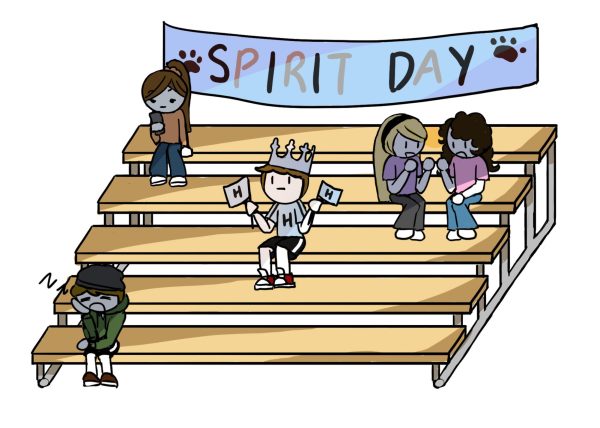Our Take: Hallway harassment must stop
“Ooh, look at you! Where you off to?”
“Show me a smile.”
“What’s your name, honey?”
“Hey girl, turn around. Show me a little something.”
“Don’t you dare walk away from me.”
On campus, students find themselves cornered in stair wells, blockaded in hallways and made to feel uncomfortable on campus by the words and threatening stances of their peers. The escalation from verbal abuse to physical assault can be quick. What’s worse, the myriad of jeers and insulting comments won’t end in high school, but rather is more prevalent across the country. 65 percent of women and 25 percent of men in the United States report being harassed by strangers in public last year, according to StopStreetHarassment.org.
Street harassment is typically comprised of public, unwanted and unwarranted wolf-whistling, catcalling and comments, gestures, or actions directed at someone, typically a woman, for their perceived or actual attraction.
Street harassment stems from misogyny and represents a major stepping stone for the feminist movement. Not only are women and large portions of the LGBTQ+ community discriminated against, they are targeted in public.
Women are advised from a young age to watch what they wear, to be careful of what they say and to never walk alone, especially at night. In a study by StopStreetHarassment.org, nearly a quarter of the women surveyed experienced street harassment by the time they were 12.
Cat calling is never a compliment.
And yet, even in the halls of this school, students, especially females, are threatened by the wolf whistles and so-called compliments their peers cannot keep to themselves.
It should not be news to students that cat calling is offensive, hurtful and uncomfortable. The jeering yells to “show a smile” or to “just say hi” come across as unwarranted invasions of personal space. Even how someone is dressed does not matter: sweat pants and t-shirts on tired students rushing to class are reason enough for some to voice their crass opinions.
Students can’t even get water without being harassed.
However, there are ways to reduce cat calls and jeering comments. The first is acceptance. People must acknowledge the fact that street harassment is not a compliment, not the fault of the target, and a form of bullying and sexual harassment.
The second is education. “Boys will be boys” is outdated and sexist. Rebranding bullying as a crush teasing someone to get their attention makes violence, oppression and cruelty synonymous with love. It sets a precedent that a man who uses his fists to keep a woman in her place is a true “man.” It forces boys to abandon a strong connection with their emotions and limits girls to weak stereotypes.
The third is action. Challenging established gender roles and teaching respect keeps people self-aware of how their actions affect the people around them and how to compliment others instead of threatening them.
So next time you compliment someone attractive in the hallway, do so with respect. And next time you witness someone getting cat called, stand up to the hallway harassers and help to make this school a safer place.
Your donation will support the student journalists of Hagerty High School. Your contribution helps us publish six issues of the BluePrint and cover our annual website hosting costs. Thank you so much!






